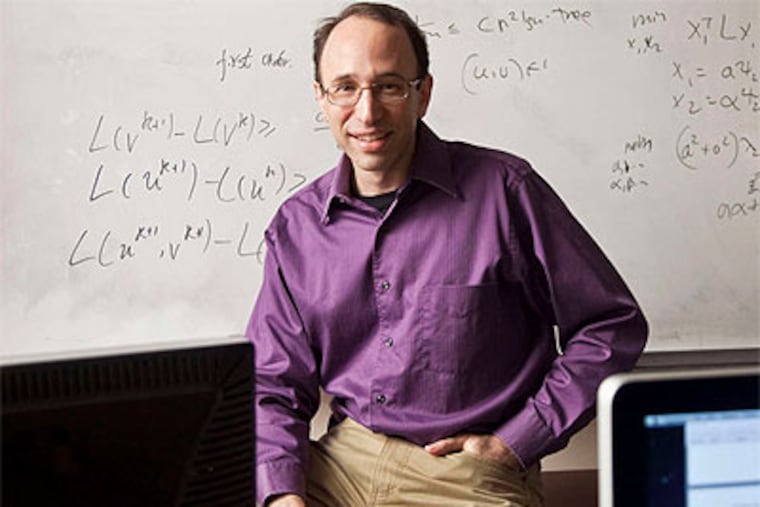A mathematician and computer scientist with area ties wins a MacArthur fellowship
Daniel Spielman's parents knew he was good at math, just not how good, because his private school used written evaluations instead of letter grades.

Daniel Spielman's parents knew he was good at math, just not how good, because his private school used written evaluations instead of letter grades.
Then at the end of seventh grade at the Philadelphia School, teachers asked the Spielmans if their son would be willing to work with a tutor - from the University of Pennsylvania.
Now 42, Spielman earned a much more public accolade on Tuesday. He and 22 others are this year's winners of the MacArthur fellowships - sometimes informally called "genius grants," though award administrators discourage that term. The winners, who hail from medicine, science and the arts, will each receive $500,000 over the next five years with no strings attached.
Spielman, a professor of computer science and mathematics at Yale University, was recognized for a range of contributions to his field, including the development of methods for solving linear equations with millions of variables. His work is theoretical but could be applied to such problems as teaching computers to recognize speech and identify images.
He is unsure how to spend the money, which he will not start to receive until January.
"My main goal is trying to find ways to get more time to do my research," Spielman said. "I've got to think creatively."
Spielman's success comes as little surprise to those who knew him years ago. Matt Zipin, who oversaw Spielman's eighth-grade independent study at the Philadelphia School, said he had a hard time keeping up with his charge.
"He was one of the smartest math students I've ever had," said Zipin, who now teaches at Germantown Friends School - the same school Spielman would later attend. "He quickly outstripped me."
Spielman attended Episcopal Academy for ninth grade, then switched to Germantown Friends for the rest of high school - where, because of his modesty, his math abilities remained a secret to many.
During senior year, one of Spielman's classmates noticed he was not in her advanced math class and asked if he was not a good math student, recalled his father, Alan L. Spielman.
In fact, Spielman was not in any math class at Germantown Friends. He was studying the subject at Penn.
"He didn't brag about it," recalled his father, a retired lawyer who lives in Center City.
That sentiment was echoed by Zipin, the teacher.
"He was never the kind of kid who would lord anything over you," Zipin said. "Cheerful, positive, just a wonderful kid in every way. Just happened to be brilliant, too."
One person who had an earlier sense of Spielman's special talents was his brother, Darren. At amusement parks, Darren Spielman recalled, his older brother would stand to one side and study the patterns of the Whac-a-Mole game before playing it himself.
"He would get like a million tickets and bring home the biggest stuffed animal," said Darren Spielman, executive director of the nonprofit Philadelphia Education Fund.
Then, when the two boys went trick-or-treating on Halloween, the future math professor would plot the most efficient routes to maximize candy collection.
Daniel Spielman learned of his fellowship while sitting in a coffee shop two weeks ago. He received a vague e-mail from the MacArthur Foundation asking him to call, and learned of his good fortune by phone.
He was sworn to secrecy until Tuesday, though he was allowed to tell his wife, speech-language pathologist Donna Marland. He may have got the math gene from his father, a former junior chess standout. Spielman's mother, Carol Ann, who died in 2003, was a speech therapist who taught at Temple University.
Family members are quick to list his other awards. In June, for example, he won a $660,000 prize from the New York-based Simons Foundation, which can be renewed in five years for a total of more than $1.3 million.
But, as with his other accomplishments, Spielman himself did not bring them up until pressed. No surprise, said his brother, Darren.
"I think it's beyond a sense or humility," the younger Spielman said. "He doesn't suppose that because he's good at this, that he's any more important than anybody else."